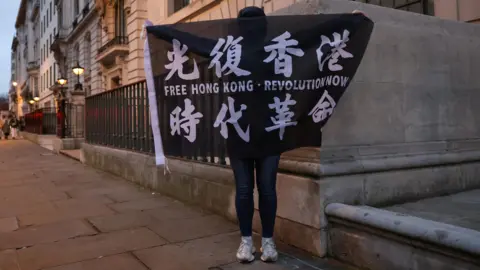The recent news from the UK regarding the Hong Kong government’s offer of cash rewards for the apprehension of pro-democracy activists residing in the UK has sparked severe condemnation. The UK authorities, including Foreign Secretary David Lammy and Home Secretary Yvette Cooper, have labeled this move as yet another manifestation of “transnational repression.” This is not merely a matter of political commentary; it highlights ongoing tensions between the UK and China, as well as the continued struggle for democratic freedoms among Hong Kong citizens.
In a joint statement issued by Lammy and Cooper, the officials expressed their serious concerns over the implications of the cash bounty, which ranges from HK$200,000 (approximately $25,000) to HK$1,000,000 ($125,000) for information leading to the capture of 19 identified pro-democracy figures living abroad. The context for this initiative rests in the backdrop of Beijing’s National Security Law, enacted in mid-2020, which aimed to quell pro-democracy protests that erupted throughout Hong Kong in 2019. The law has been widely criticized for undermining freedoms and silencing dissenting voices in the region, with the 19 activists now being pursued accused of violating these very regulations.
China, in response, has denounced international criticism regarding its actions, framing it as “interference” in its domestic affairs. This represents a pattern of escalating tensions as the two governments find themselves at odds over issues of political freedom, human rights, and the rule of law. Among the individuals on the Hong Kong police’s target list are prominent activists such as Nathan Law, a former member of the Legislative Council, and Yuan Gong-Yi, both of whom have played critical roles in advocating for democratic reforms in Hong Kong.
The bounty for information about these activists is a continuation of similar offers made in the past, the first being introduced in July and December of the previous year. Notably, Nathan Law expressed heightened concerns for his safety following the announcement of these rewards, underlining the real and pressing dangers faced by those who challenge the status quo in Hong Kong. Another distinct case involves Simon Cheng, who was formerly employed at the UK consulate and was detained under controversial circumstances in 2019, reinforcing fears associated with being targeted by Chinese authorities.
The situation has prompted the UK government to take protective measures in favor of individuals fleeing the repressive regime of Hong Kong. A special visa scheme initiated in 2021 has facilitated the relocation of around 150,000 Hong Kong citizens to the UK, allowing holders of the British National (Overseas) Passport and their dependents a much-sought pathway to British citizenship. This status was created before the UK transferred sovereignty over Hong Kong back to China in 1997, meaning that while the passport does not confer citizenship rights, it offers some level of consular assistance abroad.
As socio-political dynamics evolve, British authorities remain steadfast in their commitment to denounce human rights violations. In their recent defense, Lammy and Cooper reaffirmed their dedication to the safety, rights, and freedoms of Hongkongers in the UK, emphasizing that the UK is resolutely against the human rights abuses propagated by the Chinese regime. They committed to severing ties with Hong Kong within the Extradition Act of 2003, further demonstrating their stance against actions perceived as unjust targeting of individuals.
In conclusion, this developing saga underscores the profound complexities entwined in geopolitics and human rights as the UK and China continue to navigate a fraught relationship amid rising global scrutiny. The ramifications of these actions in Hong Kong may resonate far beyond its borders, impacting democratic movements anywhere in the world where freedoms are under threat.











